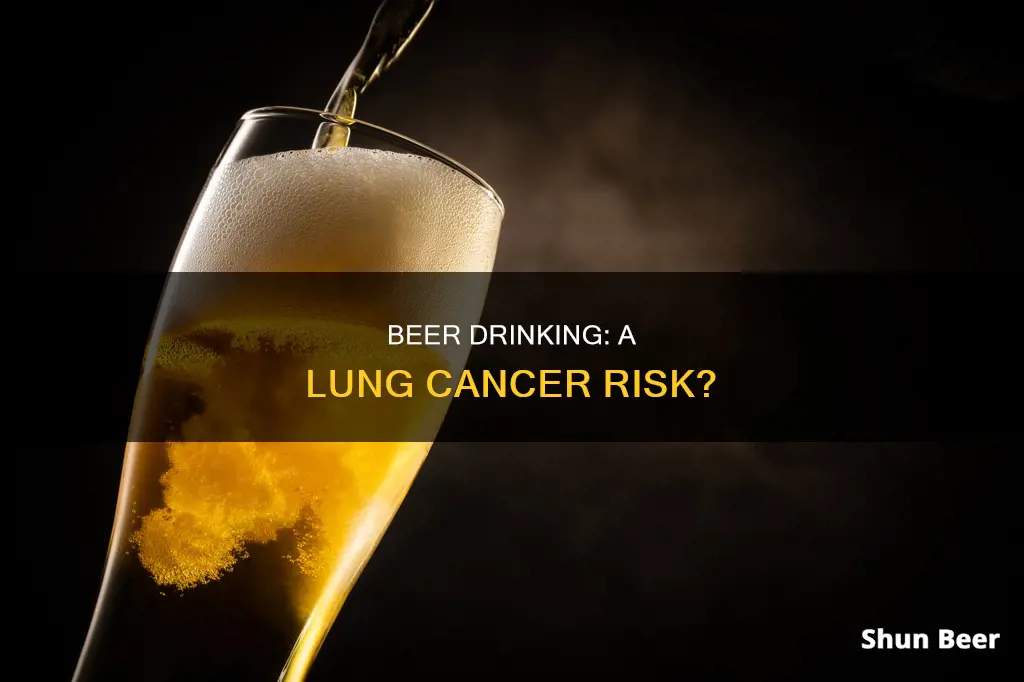
Alcohol is a known carcinogen, increasing the risk of at least seven types of cancer. While the link between alcohol consumption and lung cancer is not entirely clear, studies have shown that heavy drinking can increase the risk of developing lung cancer.
Research from the University of Liverpool Institute of Translational Medicine in 2020 suggests that alcohol use disorder is an independent risk factor for lung cancer, particularly squamous cell lung carcinoma. The study found that the same genetic variations that can lead to alcohol abuse may also increase the risk of lung cancer.
Other studies have also indicated a potential link between alcohol consumption and lung cancer, especially at higher levels of consumption. However, it is important to note that many drinkers are also smokers, which can make it challenging to establish a clear cause-and-effect relationship between alcohol and lung cancer.
While the relationship between alcohol and lung cancer is not yet fully understood, it is clear that heavy drinking can have negative impacts on overall health and increase the risk of various types of cancer.
| Characteristics | Values |
|---|---|
| Cancer risk | Alcohol is a carcinogen and increases the risk of cancer. |
| Cancer type | Alcohol is linked to breast cancer, bowel cancer, throat cancer, and lung cancer. |
| Alcohol type | All types of alcohol increase cancer risk. |
| Amount | The more alcohol consumed, the higher the cancer risk. |
| Alcohol and smoking | Drinking alcohol and smoking increases the risk of mouth and upper throat cancers. |
| Alcohol and chemotherapy | Alcohol can cause swelling in the liver, where some chemotherapy drugs are processed. |
| Inflammation | Drinking too much alcohol raises inflammation throughout the body and in separate tissues. |
| Oxidative stress | Alcohol can cause oxidative stress, threatening the balance of healthy antioxidants in cells and tissues. |
| Genetic link | Research suggests a genetic link between alcoholism and lung cancer. |
What You'll Learn

Alcohol's role in tobacco use
Alcohol and tobacco are among the most widely consumed psychoactive drugs. While tobacco smoking is the leading cause of lung cancer, alcohol has been ranked alongside smoking as a group 1 carcinogen by the International Agency for Research on Cancer.
Alcohol and tobacco use are highly correlated behaviours. People who drink are very likely to smoke and vice versa. Furthermore, people who are dependent on alcohol are also frequently dependent on some form of nicotine. Several potential mechanisms promote the combined use of alcohol and nicotine.
Alcohol is thought to promote the growth of an existing tumour rather than initiate the onset of cancer. This includes malignancies such as liver cancer, colon cancer, rectal cancer, breast cancer, and head and neck cancers.
Research from the University of Liverpool Institute of Translational Medicine strongly suggests that alcohol use disorder (AUD) is an independent risk factor for lung cancer, especially squamous cell lung carcinoma. The study contends that the same genetic variations that can predispose a person to alcohol abuse may also increase a person's risk of lung cancer. According to the investigators, six gene variants strongly linked to alcoholism are independently linked to lung cancer as well.
In people with a genetic predisposition for cancer, alcohol's effect may increase the speed by which tumour cells multiply by further destabilizing normal chromosomes and DNA.
Alcohol and tobacco use in developing countries
In developing countries like Nepal, tobacco and alcohol use are major behavioural risks, contributing to a rapid increase in non-communicable diseases (NCDs). Gender and socioeconomic status have been identified as key drivers of tobacco and alcohol use. From a gender perspective, it is mainly men within communities who demonstrate addictive behaviours. Tobacco and alcohol were also seen as a way to ward off the stresses of daily life.
Alcohol and tobacco use in high-income countries
In high-income countries such as Germany, consumption levels are high despite the well-established detrimental health effects of alcohol.
Vaccine and Beer: What's Safe to Drink?
You may want to see also

Alcohol's carcinogenic effects
Alcohol is a toxic, psychoactive, and dependence-producing substance. It has been classified as a Group 1 carcinogen by the International Agency for Research on Cancer, decades ago. This is the highest-risk group, which also includes asbestos, radiation, and tobacco.
When consumed, alcohol turns into acetaldehyde, a known carcinogen or cancer-causing agent. Acetaldehyde can damage DNA and proteins and prevent the body from repairing itself. This damage can cause cells to grow out of control, leading to tumors.
Alcohol is linked to at least seven types of cancer, including some of the most common cancer types, such as bowel cancer and female breast cancer. It is also associated with an increased risk of head and neck cancer, esophageal cancer, liver cancer, and colorectal cancer. Even one glass of alcohol can increase the risk of certain cancers, such as breast cancer, due to the increase in estrogen levels that alcohol causes.
The link between alcohol consumption and lung cancer has been more controversial. While some studies suggest that heavy alcohol consumption increases the risk of lung cancer, others indicate that moderate consumption may have a protective effect. However, it is important to note that lung cancer can occur in drinkers who have never smoked, and that heavy drinking is a risk factor that needs to be addressed for those at risk of lung cancer.
In addition to its direct carcinogenic effects, alcohol can also contribute to cancer by introducing contaminants during its production, damaging the liver, and making it easier for the body to absorb other cancer-causing chemicals, such as those found in tobacco.
Overall, any amount of alcohol consumption can increase the risk of cancer, and reducing alcohol intake is associated with a decreased risk of alcohol-related and all cancers.
Ginger Beer and Celiac Disease: Is It Safe to Drink?
You may want to see also

Alcohol and lung cancer treatment
Alcohol consumption is linked to a higher risk of developing several types of cancer, including lung cancer. Research suggests that alcohol use disorder (AUD) is an independent risk factor for lung cancer, particularly squamous cell lung carcinoma. This means that heavy drinking can increase the chances of developing lung cancer, even in those who don't smoke.
Alcohol's Impact on Lung Cancer Treatment
For individuals undergoing treatment for lung cancer, consuming alcohol can have detrimental effects. Here are some key points to consider:
- Treatment Effectiveness: Regular alcohol consumption during lung cancer treatment can reduce the effectiveness of the treatment. This includes chemotherapy, as alcohol can cause swelling in the liver, where some chemotherapy drugs are processed.
- Health Complications: Heavy drinking is associated with an increased risk of developing lung infections and diseases such as pneumonia and tuberculosis. This can be especially problematic for individuals undergoing lung cancer surgery, as untreated alcohol use disorder (AUD) can increase the risk of pneumonia, acute lung injury, and death.
- Recovery and Survival: Alcohol can also hamper recovery after lung cancer treatment. Both long-term drinking and chemotherapy weaken the immune system, making it more difficult for the body to heal. Additionally, individuals with lung cancer who continue to drink alcohol after treatment are more likely to report poor health compared to those who quit drinking.
- Genetic Predisposition: There is some evidence suggesting a genetic link between alcoholism and lung cancer. Certain gene variants associated with AUD are also linked to an increased risk of lung cancer. However, further research is needed to fully understand this relationship.
- Mental Health: High-risk behaviours, including heavy drinking, are often associated with mental health issues such as anxiety, depression, and post-traumatic stress disorder (PTSD). Addressing these underlying issues is crucial for supporting individuals in reducing their alcohol consumption during and after lung cancer treatment.
Recommendations
While the evidence suggests a link between alcohol consumption and lung cancer, more research is needed to understand the exact mechanisms involved. However, it is clear that heavy drinking is a risk factor that should be addressed as part of lung cancer prevention and treatment.
For individuals at risk of lung cancer or undergoing treatment, it is generally recommended to avoid alcohol consumption. Quitting alcohol can be challenging, and specialised support may be required. Oncologists and other healthcare professionals can play a crucial role in helping patients manage their alcohol consumption and connecting them with appropriate psychological or behavioural intervention services.
Beer and Joint Pain: Is There a Connection?
You may want to see also

Alcohol and lung cancer risk
Drinking alcohol is strongly linked with cancers all over the body, from the head and neck to the breasts, liver, colon, and rectum. However, the link between alcohol and lung cancer is less clear. While some studies suggest a correlation, others have found no connection.
Alcohol's Role in Tobacco Use
One reason for the unclear link between alcohol and lung cancer is that drinking and smoking often go hand in hand. It is difficult to determine whether alcohol or smoking is causing lung cancer in an individual who does both. Tobacco smoke is a known carcinogen, and the high rate of smoking among heavy drinkers makes it challenging to ascertain how much heavy drinking contributes to lung cancer risk.
Alcohol and Lung Cancer Treatment
Alcohol misuse can harm healthy lungs and make people more susceptible to lung infections or diseases such as pneumonia, tuberculosis, and other serious respiratory problems. Alcohol can also interfere with the effectiveness of some lung cancer medications and hamper healing after lung cancer treatment. This is because alcohol breaks down the immune system's defences and increases inflammation throughout the body and in separate tissues.
There is no safe level of drinking when it comes to cancer risk. The more alcohol you drink, the higher your risk of cancer. Binge drinking increases the likelihood of health risks such as accidents and alcohol poisoning. However, no drinking pattern is better or worse than another for cancer risk. It is important to avoid drinking during and after lung cancer treatment.
Some studies have specifically examined the link between alcohol consumption and lung cancer risk among never-smokers. A pooled analysis from the International Lung Cancer Consortium and the SYNERGY Study found an inverse association between alcohol consumption and lung cancer risk, particularly among light and moderate drinkers. However, confounding factors unrelated to smoking may have influenced these results.
Alcohol's Carcinogenic Effects
In 2010, alcohol was classified as a carcinogen (cancer-causing agent) by the U.S. Department of Health and Human Services. Alcohol is believed to promote the growth of existing tumors rather than initiate the onset of cancer. Ethanol and acetaldehyde, a major metabolite of alcohol, are thought to be genotoxic, damaging the genetic material within a cell. This effect may increase the speed at which tumor cells multiply, particularly in individuals with a genetic predisposition for cancer.
Beer and Breastfeeding: Is It Safe?
You may want to see also

Alcohol's effect on the body
Alcohol can have a wide range of effects on the body, both in the short and long term. Here is a breakdown of how alcohol affects various systems and organs in the body:
Central Nervous System
Alcohol interferes with the brain's communication pathways, impacting mood, behaviour, clear thinking, and coordination. Chronic heavy drinking can cause permanent brain damage, including Wernicke-Korsakoff syndrome, a brain disorder affecting memory. It can also damage the frontal lobe, which is responsible for executive functions like abstract reasoning, decision-making, social behaviour, and performance.
Cardiovascular System
Drinking a lot of alcohol over a long period or excessive drinking on a single occasion can damage the heart, leading to cardiomyopathy (stretching and drooping of heart muscle), arrhythmias (irregular heartbeat), and high blood pressure. Alcohol also increases the risk of heart-related issues, such as difficulty pumping blood through the body.
Digestive System
Drinking too much alcohol irritates the stomach lining, affects digestive juices, and can lead to nausea and vomiting. Years of heavy drinking can cause painful sores called ulcers and irritation of the stomach lining (gastritis). Alcohol also affects the small intestine and colon, leading to heartburn and diarrhoea, which can become long-term problems.
Liver
The liver breaks down alcohol and removes toxins from the body. Heavy drinking interferes with this process, leading to liver inflammations such as steatosis (fatty liver). Alcohol-related liver disease is a potentially life-threatening condition that causes a buildup of toxins and waste in the body. Chronic liver inflammation can lead to cirrhosis, where scar tissue forms and permanently damages the liver.
Pancreas
Alcohol causes the pancreas to produce toxic substances, leading to pancreatitis, a dangerous inflammation that causes swelling, pain, and impaired enzyme and hormone production for proper digestion.
Immune System
Drinking alcohol weakens the immune system, making the body more susceptible to diseases like pneumonia and tuberculosis. Chronic drinkers are more likely to contract these illnesses than moderate drinkers.
Skeletal and Muscle Systems
Long-term alcohol use can affect bone density, leading to thinner and more fragile bones (osteoporosis) and an increased risk of fractures. Alcohol also limits blood flow to muscles, resulting in muscle weakness, cramping, and atrophy.
Sexual and Reproductive Health
Heavy drinking can affect sex hormone production, erectile function, and achieving orgasm. Excessive drinking may also impact the menstrual cycle and increase the risk of infertility in both men and women.
Cancer
Alcohol use is associated with an increased risk of several types of cancer, including head and neck cancer, esophageal cancer, breast cancer, liver cancer, colon cancer, rectal cancer, and lung cancer. The more alcohol consumed, particularly over time, the higher the risk of developing alcohol-associated cancer. Even moderate drinking can increase the risk of certain cancers.
Drinking and Driving: DUI Risks After One Beer
You may want to see also
Frequently asked questions
Drinking alcohol is linked to cancers all over the body, including the lungs. However, studies have not shown a clear connection between alcohol and lung cancer.
Drinking alcohol increases the risk of cancer in general. The more alcohol you drink, the higher your risk of cancer.
Yes, drinking alcohol is worse for you if you also smoke. For example, people who smoke and drink are at a higher risk of mouth and upper throat cancers.
The American Cancer Society recommends that women have no more than one drink a day and men no more than two. However, it's important to note that there is no completely safe level of drinking, and even small amounts of alcohol can increase the risk of cancer.







